Examining Health Disparities: Gender, Age, and Ethnicity in the UK
VerifiedAdded on 2023/06/11
|8
|2684
|388
Report
AI Summary
This report examines health inequalities in maternity care, focusing on the disparities faced by ethnic minority women due to gender, age, and ethnicity. It highlights issues such as high mortality rates, inadequate care during and after labor, and the lack of proper medical facilities and education. The report discusses existing NHS policies aimed at addressing these inequalities, such as the NHS plan (2000) and maternity leave policies, while also pointing out gaps in their implementation, particularly concerning women who are not UK citizens or those facing financial crises. Suggestions for improvement include ensuring equal access to maternity care regardless of citizenship, providing free services to financially vulnerable women, and raising awareness about policy benefits to ensure proper implementation and address discrimination. The report concludes that healthcare inequalities significantly impact the lives and health outcomes of ethnic minority women and that focused efforts are needed to bridge these gaps.
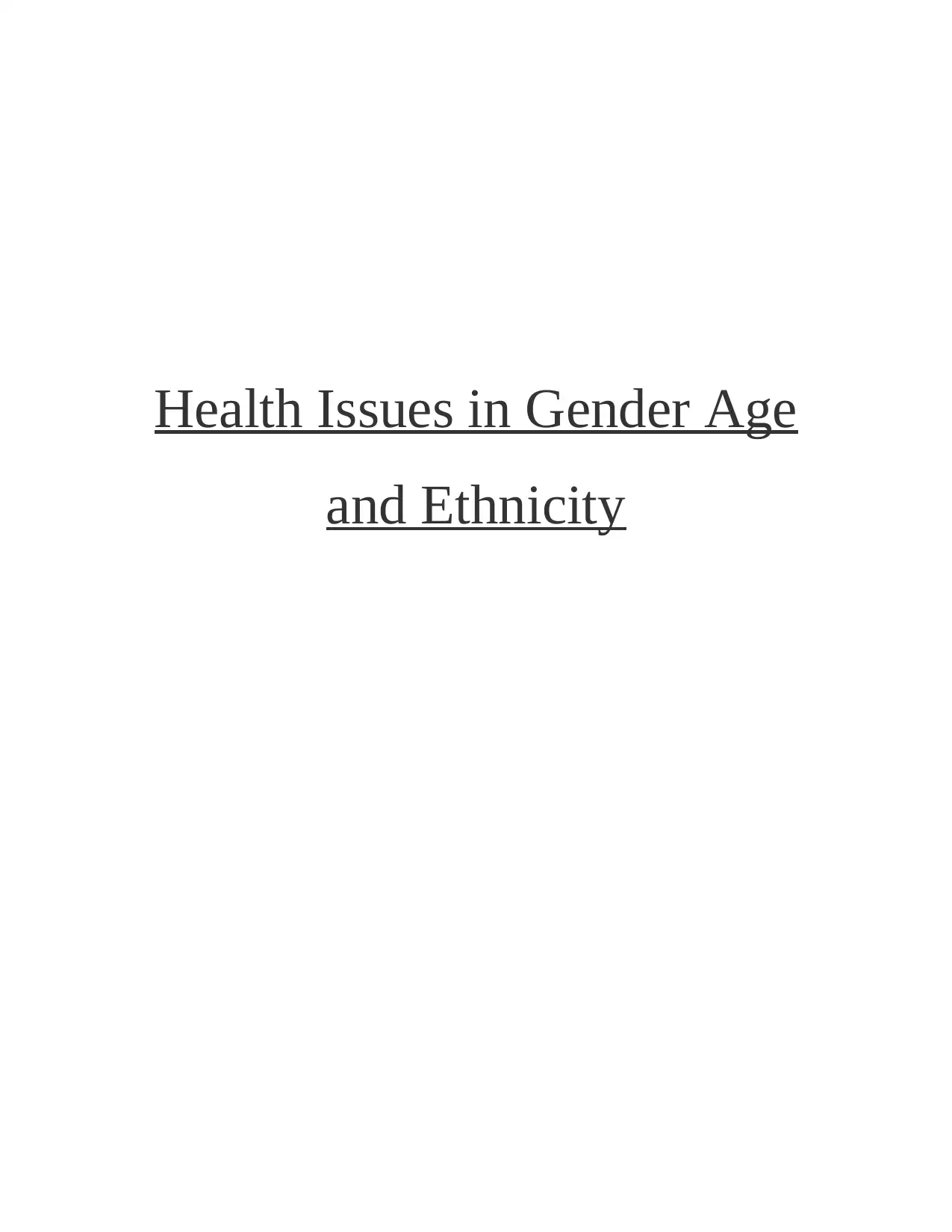
Health Issues in Gender Age
and Ethnicity
and Ethnicity
Paraphrase This Document
Need a fresh take? Get an instant paraphrase of this document with our AI Paraphraser
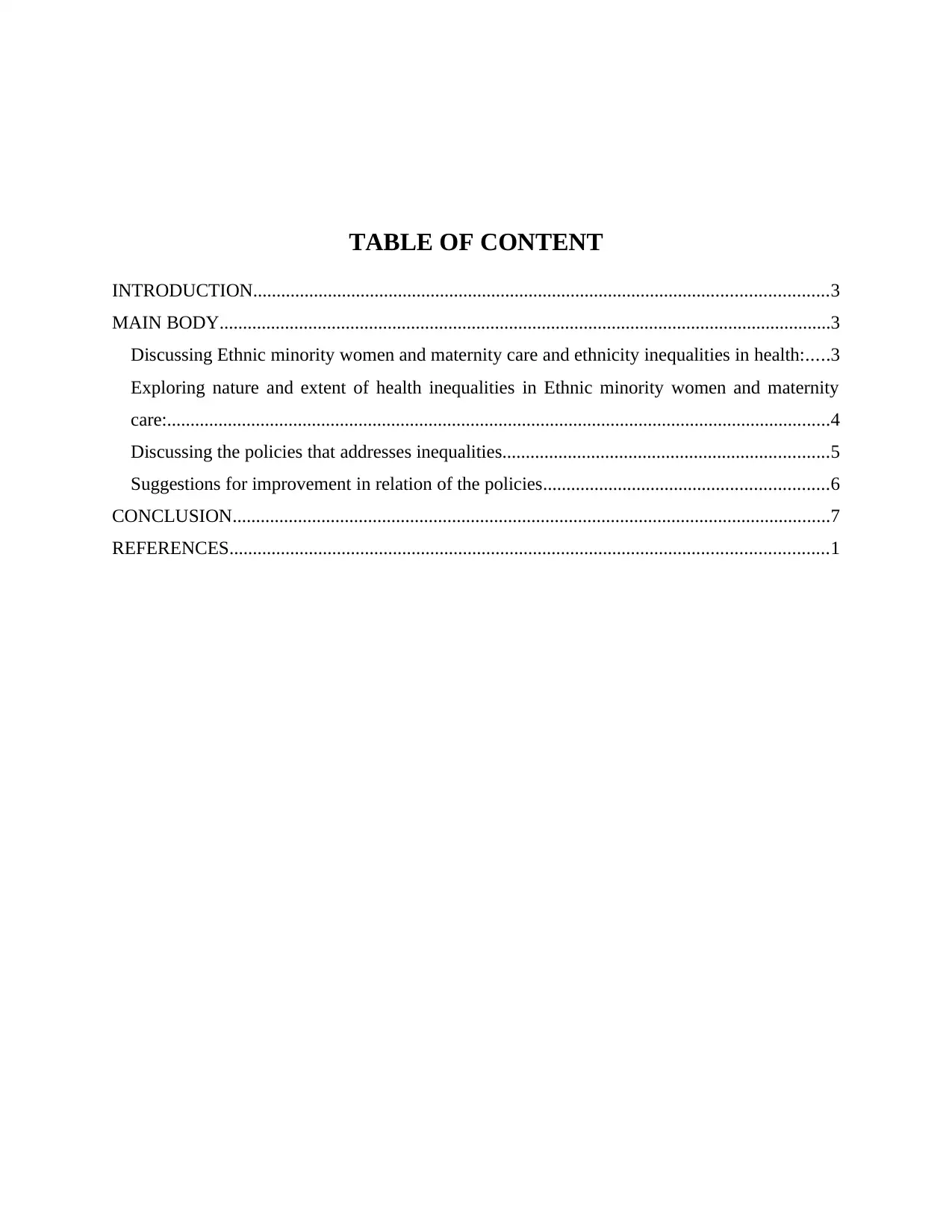
TABLE OF CONTENT
INTRODUCTION...........................................................................................................................3
MAIN BODY...................................................................................................................................3
Discussing Ethnic minority women and maternity care and ethnicity inequalities in health:.....3
Exploring nature and extent of health inequalities in Ethnic minority women and maternity
care:..............................................................................................................................................4
Discussing the policies that addresses inequalities......................................................................5
Suggestions for improvement in relation of the policies.............................................................6
CONCLUSION................................................................................................................................7
REFERENCES................................................................................................................................1
INTRODUCTION...........................................................................................................................3
MAIN BODY...................................................................................................................................3
Discussing Ethnic minority women and maternity care and ethnicity inequalities in health:.....3
Exploring nature and extent of health inequalities in Ethnic minority women and maternity
care:..............................................................................................................................................4
Discussing the policies that addresses inequalities......................................................................5
Suggestions for improvement in relation of the policies.............................................................6
CONCLUSION................................................................................................................................7
REFERENCES................................................................................................................................1
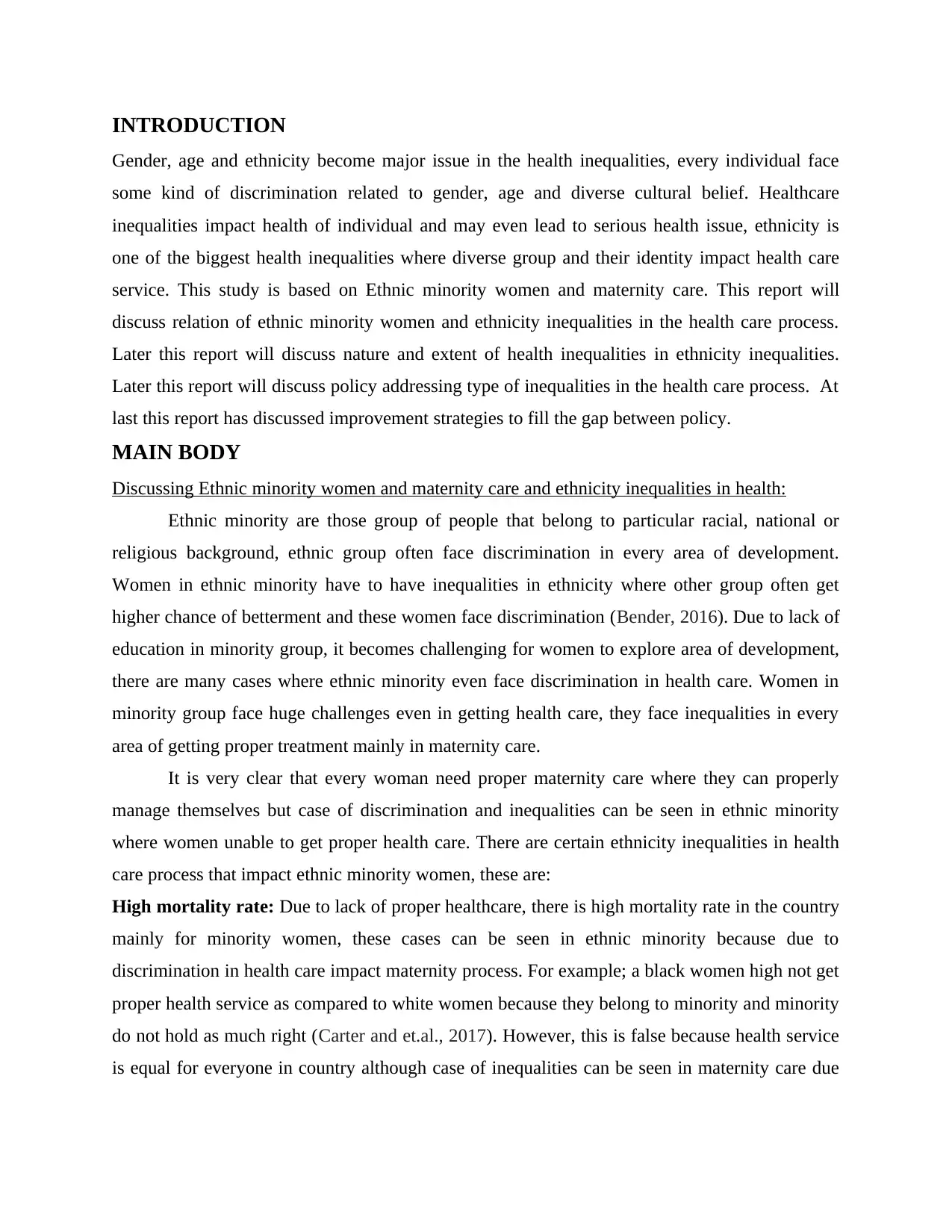
INTRODUCTION
Gender, age and ethnicity become major issue in the health inequalities, every individual face
some kind of discrimination related to gender, age and diverse cultural belief. Healthcare
inequalities impact health of individual and may even lead to serious health issue, ethnicity is
one of the biggest health inequalities where diverse group and their identity impact health care
service. This study is based on Ethnic minority women and maternity care. This report will
discuss relation of ethnic minority women and ethnicity inequalities in the health care process.
Later this report will discuss nature and extent of health inequalities in ethnicity inequalities.
Later this report will discuss policy addressing type of inequalities in the health care process. At
last this report has discussed improvement strategies to fill the gap between policy.
MAIN BODY
Discussing Ethnic minority women and maternity care and ethnicity inequalities in health:
Ethnic minority are those group of people that belong to particular racial, national or
religious background, ethnic group often face discrimination in every area of development.
Women in ethnic minority have to have inequalities in ethnicity where other group often get
higher chance of betterment and these women face discrimination (Bender, 2016). Due to lack of
education in minority group, it becomes challenging for women to explore area of development,
there are many cases where ethnic minority even face discrimination in health care. Women in
minority group face huge challenges even in getting health care, they face inequalities in every
area of getting proper treatment mainly in maternity care.
It is very clear that every woman need proper maternity care where they can properly
manage themselves but case of discrimination and inequalities can be seen in ethnic minority
where women unable to get proper health care. There are certain ethnicity inequalities in health
care process that impact ethnic minority women, these are:
High mortality rate: Due to lack of proper healthcare, there is high mortality rate in the country
mainly for minority women, these cases can be seen in ethnic minority because due to
discrimination in health care impact maternity process. For example; a black women high not get
proper health service as compared to white women because they belong to minority and minority
do not hold as much right (Carter and et.al., 2017). However, this is false because health service
is equal for everyone in country although case of inequalities can be seen in maternity care due
Gender, age and ethnicity become major issue in the health inequalities, every individual face
some kind of discrimination related to gender, age and diverse cultural belief. Healthcare
inequalities impact health of individual and may even lead to serious health issue, ethnicity is
one of the biggest health inequalities where diverse group and their identity impact health care
service. This study is based on Ethnic minority women and maternity care. This report will
discuss relation of ethnic minority women and ethnicity inequalities in the health care process.
Later this report will discuss nature and extent of health inequalities in ethnicity inequalities.
Later this report will discuss policy addressing type of inequalities in the health care process. At
last this report has discussed improvement strategies to fill the gap between policy.
MAIN BODY
Discussing Ethnic minority women and maternity care and ethnicity inequalities in health:
Ethnic minority are those group of people that belong to particular racial, national or
religious background, ethnic group often face discrimination in every area of development.
Women in ethnic minority have to have inequalities in ethnicity where other group often get
higher chance of betterment and these women face discrimination (Bender, 2016). Due to lack of
education in minority group, it becomes challenging for women to explore area of development,
there are many cases where ethnic minority even face discrimination in health care. Women in
minority group face huge challenges even in getting health care, they face inequalities in every
area of getting proper treatment mainly in maternity care.
It is very clear that every woman need proper maternity care where they can properly
manage themselves but case of discrimination and inequalities can be seen in ethnic minority
where women unable to get proper health care. There are certain ethnicity inequalities in health
care process that impact ethnic minority women, these are:
High mortality rate: Due to lack of proper healthcare, there is high mortality rate in the country
mainly for minority women, these cases can be seen in ethnic minority because due to
discrimination in health care impact maternity process. For example; a black women high not get
proper health service as compared to white women because they belong to minority and minority
do not hold as much right (Carter and et.al., 2017). However, this is false because health service
is equal for everyone in country although case of inequalities can be seen in maternity care due
⊘ This is a preview!⊘
Do you want full access?
Subscribe today to unlock all pages.

Trusted by 1+ million students worldwide
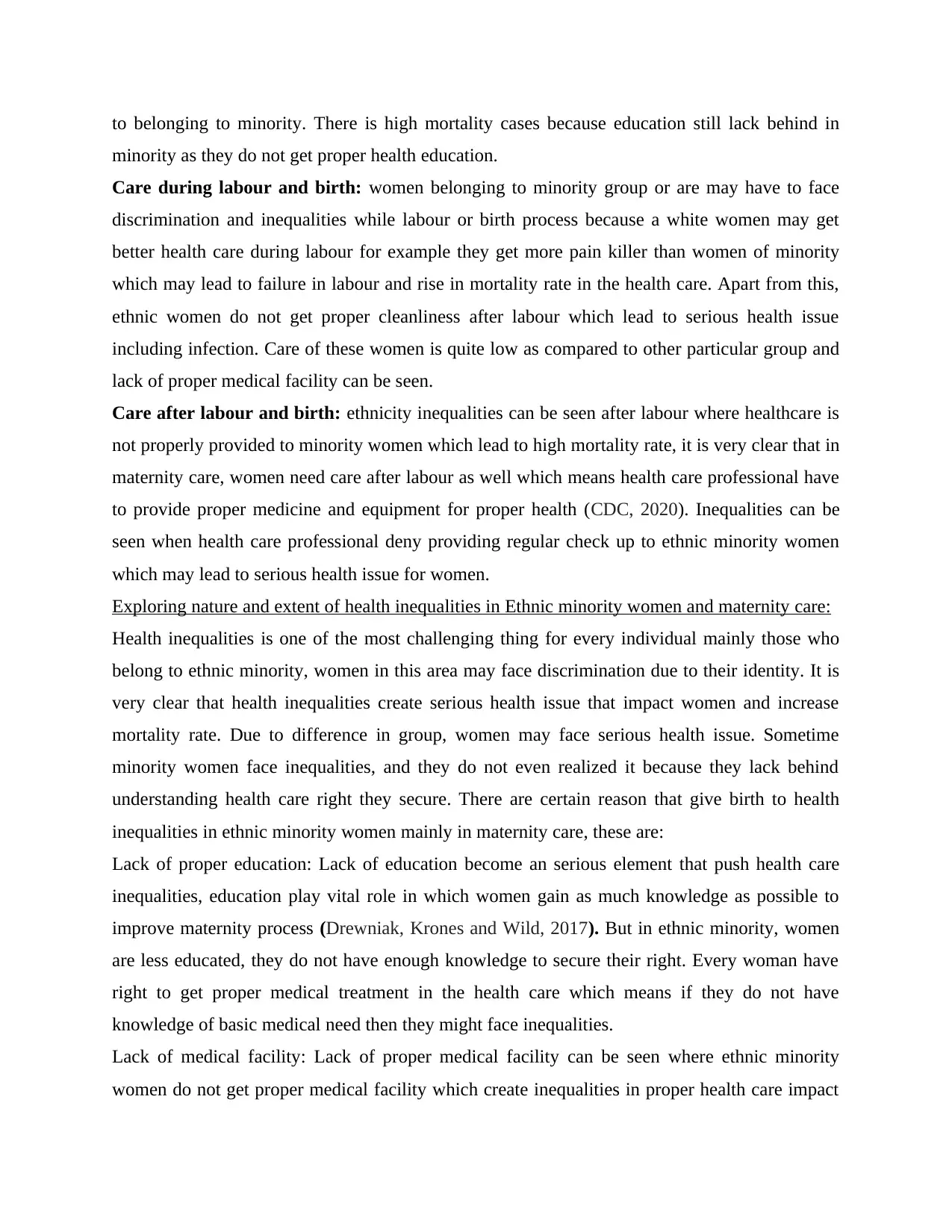
to belonging to minority. There is high mortality cases because education still lack behind in
minority as they do not get proper health education.
Care during labour and birth: women belonging to minority group or are may have to face
discrimination and inequalities while labour or birth process because a white women may get
better health care during labour for example they get more pain killer than women of minority
which may lead to failure in labour and rise in mortality rate in the health care. Apart from this,
ethnic women do not get proper cleanliness after labour which lead to serious health issue
including infection. Care of these women is quite low as compared to other particular group and
lack of proper medical facility can be seen.
Care after labour and birth: ethnicity inequalities can be seen after labour where healthcare is
not properly provided to minority women which lead to high mortality rate, it is very clear that in
maternity care, women need care after labour as well which means health care professional have
to provide proper medicine and equipment for proper health (CDC, 2020). Inequalities can be
seen when health care professional deny providing regular check up to ethnic minority women
which may lead to serious health issue for women.
Exploring nature and extent of health inequalities in Ethnic minority women and maternity care:
Health inequalities is one of the most challenging thing for every individual mainly those who
belong to ethnic minority, women in this area may face discrimination due to their identity. It is
very clear that health inequalities create serious health issue that impact women and increase
mortality rate. Due to difference in group, women may face serious health issue. Sometime
minority women face inequalities, and they do not even realized it because they lack behind
understanding health care right they secure. There are certain reason that give birth to health
inequalities in ethnic minority women mainly in maternity care, these are:
Lack of proper education: Lack of education become an serious element that push health care
inequalities, education play vital role in which women gain as much knowledge as possible to
improve maternity process (Drewniak, Krones and Wild, 2017). But in ethnic minority, women
are less educated, they do not have enough knowledge to secure their right. Every woman have
right to get proper medical treatment in the health care which means if they do not have
knowledge of basic medical need then they might face inequalities.
Lack of medical facility: Lack of proper medical facility can be seen where ethnic minority
women do not get proper medical facility which create inequalities in proper health care impact
minority as they do not get proper health education.
Care during labour and birth: women belonging to minority group or are may have to face
discrimination and inequalities while labour or birth process because a white women may get
better health care during labour for example they get more pain killer than women of minority
which may lead to failure in labour and rise in mortality rate in the health care. Apart from this,
ethnic women do not get proper cleanliness after labour which lead to serious health issue
including infection. Care of these women is quite low as compared to other particular group and
lack of proper medical facility can be seen.
Care after labour and birth: ethnicity inequalities can be seen after labour where healthcare is
not properly provided to minority women which lead to high mortality rate, it is very clear that in
maternity care, women need care after labour as well which means health care professional have
to provide proper medicine and equipment for proper health (CDC, 2020). Inequalities can be
seen when health care professional deny providing regular check up to ethnic minority women
which may lead to serious health issue for women.
Exploring nature and extent of health inequalities in Ethnic minority women and maternity care:
Health inequalities is one of the most challenging thing for every individual mainly those who
belong to ethnic minority, women in this area may face discrimination due to their identity. It is
very clear that health inequalities create serious health issue that impact women and increase
mortality rate. Due to difference in group, women may face serious health issue. Sometime
minority women face inequalities, and they do not even realized it because they lack behind
understanding health care right they secure. There are certain reason that give birth to health
inequalities in ethnic minority women mainly in maternity care, these are:
Lack of proper education: Lack of education become an serious element that push health care
inequalities, education play vital role in which women gain as much knowledge as possible to
improve maternity process (Drewniak, Krones and Wild, 2017). But in ethnic minority, women
are less educated, they do not have enough knowledge to secure their right. Every woman have
right to get proper medical treatment in the health care which means if they do not have
knowledge of basic medical need then they might face inequalities.
Lack of medical facility: Lack of proper medical facility can be seen where ethnic minority
women do not get proper medical facility which create inequalities in proper health care impact
Paraphrase This Document
Need a fresh take? Get an instant paraphrase of this document with our AI Paraphraser
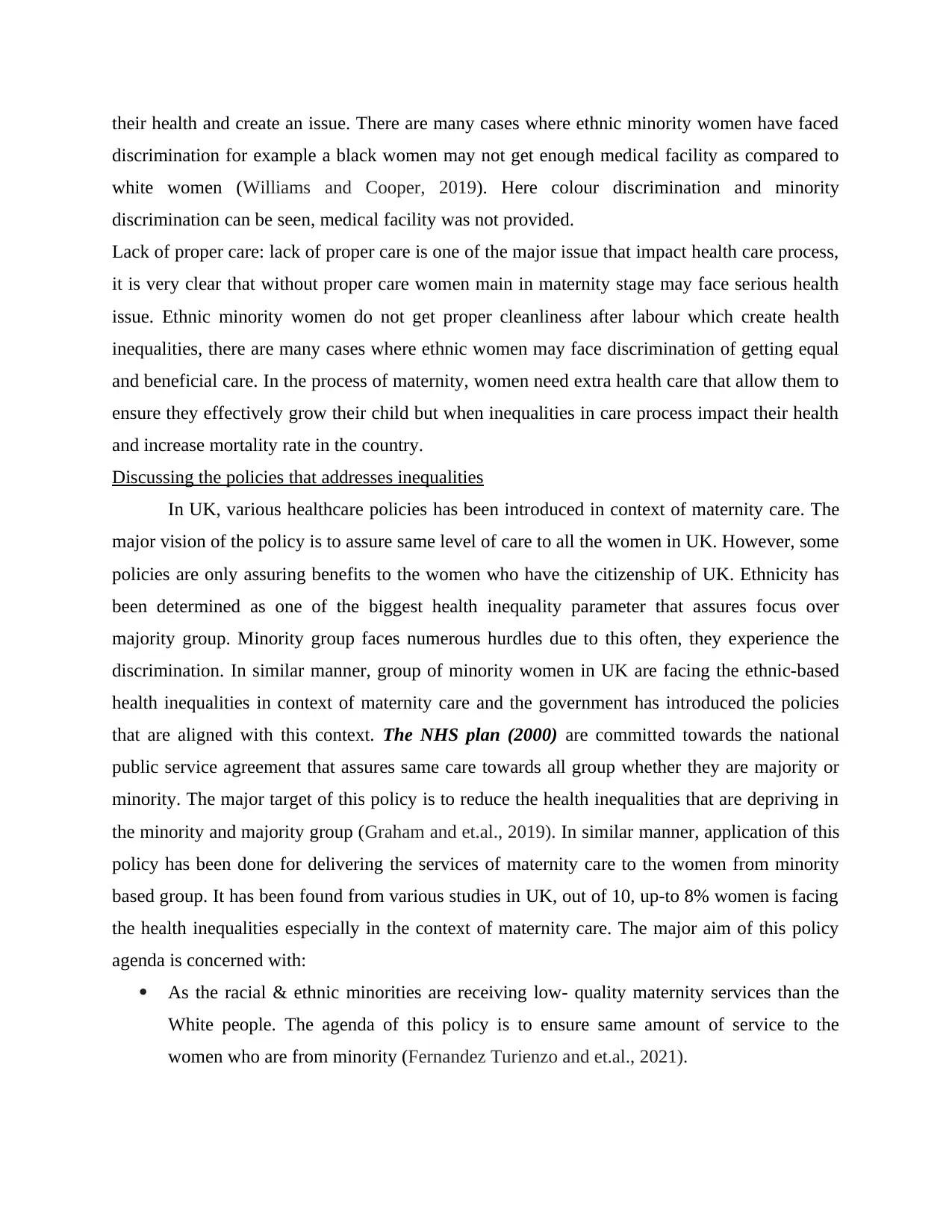
their health and create an issue. There are many cases where ethnic minority women have faced
discrimination for example a black women may not get enough medical facility as compared to
white women (Williams and Cooper, 2019). Here colour discrimination and minority
discrimination can be seen, medical facility was not provided.
Lack of proper care: lack of proper care is one of the major issue that impact health care process,
it is very clear that without proper care women main in maternity stage may face serious health
issue. Ethnic minority women do not get proper cleanliness after labour which create health
inequalities, there are many cases where ethnic women may face discrimination of getting equal
and beneficial care. In the process of maternity, women need extra health care that allow them to
ensure they effectively grow their child but when inequalities in care process impact their health
and increase mortality rate in the country.
Discussing the policies that addresses inequalities
In UK, various healthcare policies has been introduced in context of maternity care. The
major vision of the policy is to assure same level of care to all the women in UK. However, some
policies are only assuring benefits to the women who have the citizenship of UK. Ethnicity has
been determined as one of the biggest health inequality parameter that assures focus over
majority group. Minority group faces numerous hurdles due to this often, they experience the
discrimination. In similar manner, group of minority women in UK are facing the ethnic-based
health inequalities in context of maternity care and the government has introduced the policies
that are aligned with this context. The NHS plan (2000) are committed towards the national
public service agreement that assures same care towards all group whether they are majority or
minority. The major target of this policy is to reduce the health inequalities that are depriving in
the minority and majority group (Graham and et.al., 2019). In similar manner, application of this
policy has been done for delivering the services of maternity care to the women from minority
based group. It has been found from various studies in UK, out of 10, up-to 8% women is facing
the health inequalities especially in the context of maternity care. The major aim of this policy
agenda is concerned with:
As the racial & ethnic minorities are receiving low- quality maternity services than the
White people. The agenda of this policy is to ensure same amount of service to the
women who are from minority (Fernandez Turienzo and et.al., 2021).
discrimination for example a black women may not get enough medical facility as compared to
white women (Williams and Cooper, 2019). Here colour discrimination and minority
discrimination can be seen, medical facility was not provided.
Lack of proper care: lack of proper care is one of the major issue that impact health care process,
it is very clear that without proper care women main in maternity stage may face serious health
issue. Ethnic minority women do not get proper cleanliness after labour which create health
inequalities, there are many cases where ethnic women may face discrimination of getting equal
and beneficial care. In the process of maternity, women need extra health care that allow them to
ensure they effectively grow their child but when inequalities in care process impact their health
and increase mortality rate in the country.
Discussing the policies that addresses inequalities
In UK, various healthcare policies has been introduced in context of maternity care. The
major vision of the policy is to assure same level of care to all the women in UK. However, some
policies are only assuring benefits to the women who have the citizenship of UK. Ethnicity has
been determined as one of the biggest health inequality parameter that assures focus over
majority group. Minority group faces numerous hurdles due to this often, they experience the
discrimination. In similar manner, group of minority women in UK are facing the ethnic-based
health inequalities in context of maternity care and the government has introduced the policies
that are aligned with this context. The NHS plan (2000) are committed towards the national
public service agreement that assures same care towards all group whether they are majority or
minority. The major target of this policy is to reduce the health inequalities that are depriving in
the minority and majority group (Graham and et.al., 2019). In similar manner, application of this
policy has been done for delivering the services of maternity care to the women from minority
based group. It has been found from various studies in UK, out of 10, up-to 8% women is facing
the health inequalities especially in the context of maternity care. The major aim of this policy
agenda is concerned with:
As the racial & ethnic minorities are receiving low- quality maternity services than the
White people. The agenda of this policy is to ensure same amount of service to the
women who are from minority (Fernandez Turienzo and et.al., 2021).
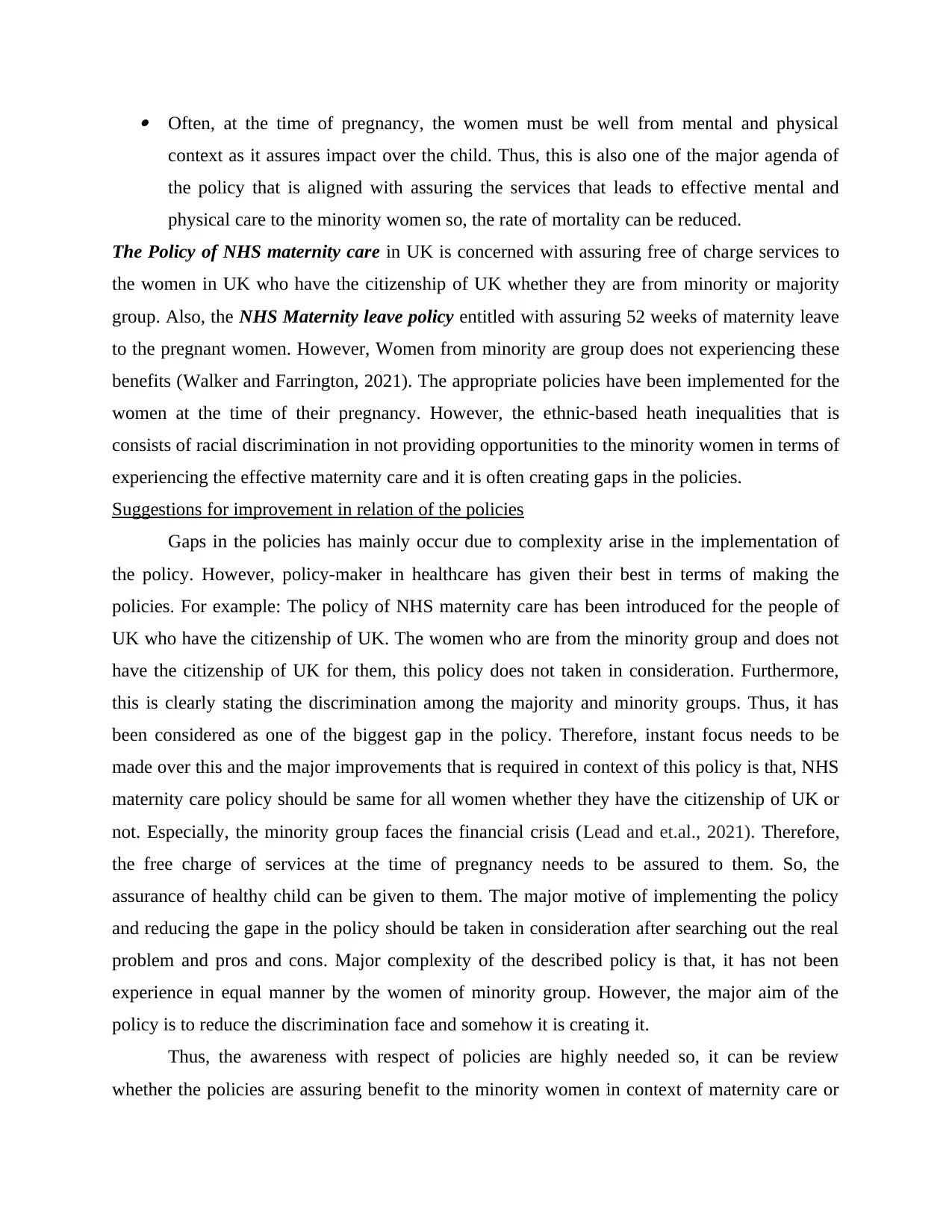
Often, at the time of pregnancy, the women must be well from mental and physical
context as it assures impact over the child. Thus, this is also one of the major agenda of
the policy that is aligned with assuring the services that leads to effective mental and
physical care to the minority women so, the rate of mortality can be reduced.
The Policy of NHS maternity care in UK is concerned with assuring free of charge services to
the women in UK who have the citizenship of UK whether they are from minority or majority
group. Also, the NHS Maternity leave policy entitled with assuring 52 weeks of maternity leave
to the pregnant women. However, Women from minority are group does not experiencing these
benefits (Walker and Farrington, 2021). The appropriate policies have been implemented for the
women at the time of their pregnancy. However, the ethnic-based heath inequalities that is
consists of racial discrimination in not providing opportunities to the minority women in terms of
experiencing the effective maternity care and it is often creating gaps in the policies.
Suggestions for improvement in relation of the policies
Gaps in the policies has mainly occur due to complexity arise in the implementation of
the policy. However, policy-maker in healthcare has given their best in terms of making the
policies. For example: The policy of NHS maternity care has been introduced for the people of
UK who have the citizenship of UK. The women who are from the minority group and does not
have the citizenship of UK for them, this policy does not taken in consideration. Furthermore,
this is clearly stating the discrimination among the majority and minority groups. Thus, it has
been considered as one of the biggest gap in the policy. Therefore, instant focus needs to be
made over this and the major improvements that is required in context of this policy is that, NHS
maternity care policy should be same for all women whether they have the citizenship of UK or
not. Especially, the minority group faces the financial crisis (Lead and et.al., 2021). Therefore,
the free charge of services at the time of pregnancy needs to be assured to them. So, the
assurance of healthy child can be given to them. The major motive of implementing the policy
and reducing the gape in the policy should be taken in consideration after searching out the real
problem and pros and cons. Major complexity of the described policy is that, it has not been
experience in equal manner by the women of minority group. However, the major aim of the
policy is to reduce the discrimination face and somehow it is creating it.
Thus, the awareness with respect of policies are highly needed so, it can be review
whether the policies are assuring benefit to the minority women in context of maternity care or
context as it assures impact over the child. Thus, this is also one of the major agenda of
the policy that is aligned with assuring the services that leads to effective mental and
physical care to the minority women so, the rate of mortality can be reduced.
The Policy of NHS maternity care in UK is concerned with assuring free of charge services to
the women in UK who have the citizenship of UK whether they are from minority or majority
group. Also, the NHS Maternity leave policy entitled with assuring 52 weeks of maternity leave
to the pregnant women. However, Women from minority are group does not experiencing these
benefits (Walker and Farrington, 2021). The appropriate policies have been implemented for the
women at the time of their pregnancy. However, the ethnic-based heath inequalities that is
consists of racial discrimination in not providing opportunities to the minority women in terms of
experiencing the effective maternity care and it is often creating gaps in the policies.
Suggestions for improvement in relation of the policies
Gaps in the policies has mainly occur due to complexity arise in the implementation of
the policy. However, policy-maker in healthcare has given their best in terms of making the
policies. For example: The policy of NHS maternity care has been introduced for the people of
UK who have the citizenship of UK. The women who are from the minority group and does not
have the citizenship of UK for them, this policy does not taken in consideration. Furthermore,
this is clearly stating the discrimination among the majority and minority groups. Thus, it has
been considered as one of the biggest gap in the policy. Therefore, instant focus needs to be
made over this and the major improvements that is required in context of this policy is that, NHS
maternity care policy should be same for all women whether they have the citizenship of UK or
not. Especially, the minority group faces the financial crisis (Lead and et.al., 2021). Therefore,
the free charge of services at the time of pregnancy needs to be assured to them. So, the
assurance of healthy child can be given to them. The major motive of implementing the policy
and reducing the gape in the policy should be taken in consideration after searching out the real
problem and pros and cons. Major complexity of the described policy is that, it has not been
experience in equal manner by the women of minority group. However, the major aim of the
policy is to reduce the discrimination face and somehow it is creating it.
Thus, the awareness with respect of policies are highly needed so, it can be review
whether the policies are assuring benefit to the minority women in context of maternity care or
⊘ This is a preview!⊘
Do you want full access?
Subscribe today to unlock all pages.

Trusted by 1+ million students worldwide
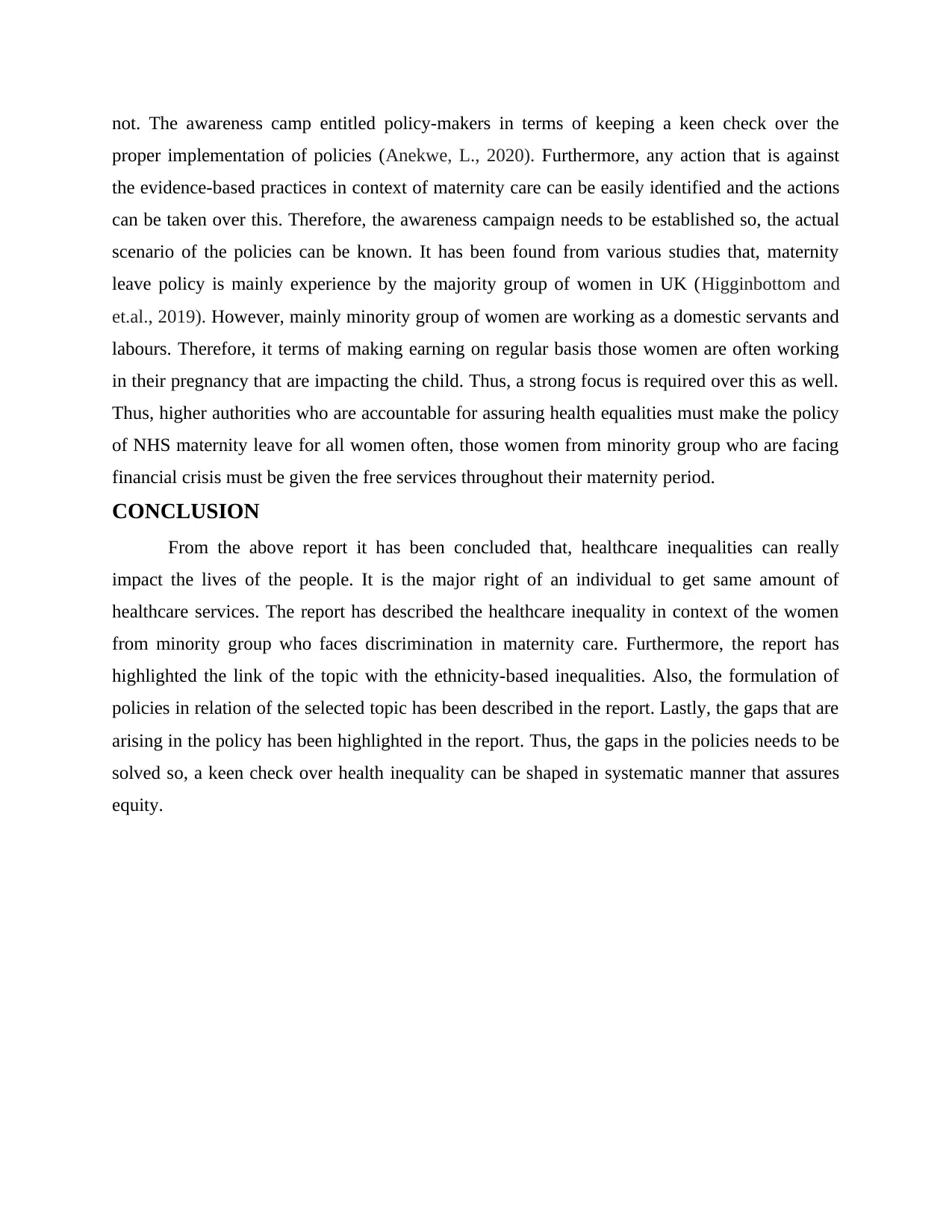
not. The awareness camp entitled policy-makers in terms of keeping a keen check over the
proper implementation of policies (Anekwe, L., 2020). Furthermore, any action that is against
the evidence-based practices in context of maternity care can be easily identified and the actions
can be taken over this. Therefore, the awareness campaign needs to be established so, the actual
scenario of the policies can be known. It has been found from various studies that, maternity
leave policy is mainly experience by the majority group of women in UK (Higginbottom and
et.al., 2019). However, mainly minority group of women are working as a domestic servants and
labours. Therefore, it terms of making earning on regular basis those women are often working
in their pregnancy that are impacting the child. Thus, a strong focus is required over this as well.
Thus, higher authorities who are accountable for assuring health equalities must make the policy
of NHS maternity leave for all women often, those women from minority group who are facing
financial crisis must be given the free services throughout their maternity period.
CONCLUSION
From the above report it has been concluded that, healthcare inequalities can really
impact the lives of the people. It is the major right of an individual to get same amount of
healthcare services. The report has described the healthcare inequality in context of the women
from minority group who faces discrimination in maternity care. Furthermore, the report has
highlighted the link of the topic with the ethnicity-based inequalities. Also, the formulation of
policies in relation of the selected topic has been described in the report. Lastly, the gaps that are
arising in the policy has been highlighted in the report. Thus, the gaps in the policies needs to be
solved so, a keen check over health inequality can be shaped in systematic manner that assures
equity.
proper implementation of policies (Anekwe, L., 2020). Furthermore, any action that is against
the evidence-based practices in context of maternity care can be easily identified and the actions
can be taken over this. Therefore, the awareness campaign needs to be established so, the actual
scenario of the policies can be known. It has been found from various studies that, maternity
leave policy is mainly experience by the majority group of women in UK (Higginbottom and
et.al., 2019). However, mainly minority group of women are working as a domestic servants and
labours. Therefore, it terms of making earning on regular basis those women are often working
in their pregnancy that are impacting the child. Thus, a strong focus is required over this as well.
Thus, higher authorities who are accountable for assuring health equalities must make the policy
of NHS maternity leave for all women often, those women from minority group who are facing
financial crisis must be given the free services throughout their maternity period.
CONCLUSION
From the above report it has been concluded that, healthcare inequalities can really
impact the lives of the people. It is the major right of an individual to get same amount of
healthcare services. The report has described the healthcare inequality in context of the women
from minority group who faces discrimination in maternity care. Furthermore, the report has
highlighted the link of the topic with the ethnicity-based inequalities. Also, the formulation of
policies in relation of the selected topic has been described in the report. Lastly, the gaps that are
arising in the policy has been highlighted in the report. Thus, the gaps in the policies needs to be
solved so, a keen check over health inequality can be shaped in systematic manner that assures
equity.
Paraphrase This Document
Need a fresh take? Get an instant paraphrase of this document with our AI Paraphraser
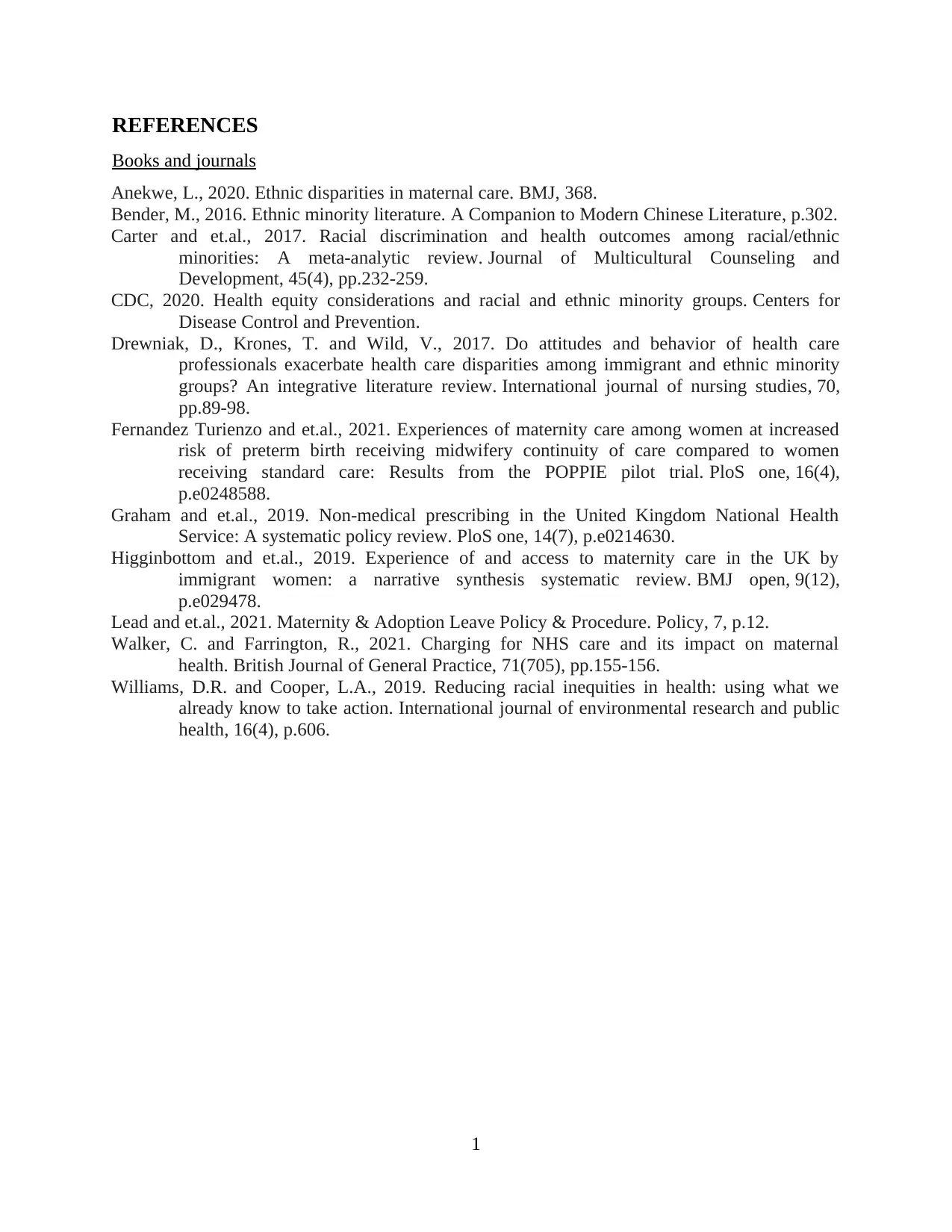
REFERENCES
Books and journals
Anekwe, L., 2020. Ethnic disparities in maternal care. BMJ, 368.
Bender, M., 2016. Ethnic minority literature. A Companion to Modern Chinese Literature, p.302.
Carter and et.al., 2017. Racial discrimination and health outcomes among racial/ethnic
minorities: A meta‐analytic review. Journal of Multicultural Counseling and
Development, 45(4), pp.232-259.
CDC, 2020. Health equity considerations and racial and ethnic minority groups. Centers for
Disease Control and Prevention.
Drewniak, D., Krones, T. and Wild, V., 2017. Do attitudes and behavior of health care
professionals exacerbate health care disparities among immigrant and ethnic minority
groups? An integrative literature review. International journal of nursing studies, 70,
pp.89-98.
Fernandez Turienzo and et.al., 2021. Experiences of maternity care among women at increased
risk of preterm birth receiving midwifery continuity of care compared to women
receiving standard care: Results from the POPPIE pilot trial. PloS one, 16(4),
p.e0248588.
Graham and et.al., 2019. Non-medical prescribing in the United Kingdom National Health
Service: A systematic policy review. PloS one, 14(7), p.e0214630.
Higginbottom and et.al., 2019. Experience of and access to maternity care in the UK by
immigrant women: a narrative synthesis systematic review. BMJ open, 9(12),
p.e029478.
Lead and et.al., 2021. Maternity & Adoption Leave Policy & Procedure. Policy, 7, p.12.
Walker, C. and Farrington, R., 2021. Charging for NHS care and its impact on maternal
health. British Journal of General Practice, 71(705), pp.155-156.
Williams, D.R. and Cooper, L.A., 2019. Reducing racial inequities in health: using what we
already know to take action. International journal of environmental research and public
health, 16(4), p.606.
1
Books and journals
Anekwe, L., 2020. Ethnic disparities in maternal care. BMJ, 368.
Bender, M., 2016. Ethnic minority literature. A Companion to Modern Chinese Literature, p.302.
Carter and et.al., 2017. Racial discrimination and health outcomes among racial/ethnic
minorities: A meta‐analytic review. Journal of Multicultural Counseling and
Development, 45(4), pp.232-259.
CDC, 2020. Health equity considerations and racial and ethnic minority groups. Centers for
Disease Control and Prevention.
Drewniak, D., Krones, T. and Wild, V., 2017. Do attitudes and behavior of health care
professionals exacerbate health care disparities among immigrant and ethnic minority
groups? An integrative literature review. International journal of nursing studies, 70,
pp.89-98.
Fernandez Turienzo and et.al., 2021. Experiences of maternity care among women at increased
risk of preterm birth receiving midwifery continuity of care compared to women
receiving standard care: Results from the POPPIE pilot trial. PloS one, 16(4),
p.e0248588.
Graham and et.al., 2019. Non-medical prescribing in the United Kingdom National Health
Service: A systematic policy review. PloS one, 14(7), p.e0214630.
Higginbottom and et.al., 2019. Experience of and access to maternity care in the UK by
immigrant women: a narrative synthesis systematic review. BMJ open, 9(12),
p.e029478.
Lead and et.al., 2021. Maternity & Adoption Leave Policy & Procedure. Policy, 7, p.12.
Walker, C. and Farrington, R., 2021. Charging for NHS care and its impact on maternal
health. British Journal of General Practice, 71(705), pp.155-156.
Williams, D.R. and Cooper, L.A., 2019. Reducing racial inequities in health: using what we
already know to take action. International journal of environmental research and public
health, 16(4), p.606.
1
1 out of 8
Related Documents
Your All-in-One AI-Powered Toolkit for Academic Success.
+13062052269
info@desklib.com
Available 24*7 on WhatsApp / Email
![[object Object]](/_next/static/media/star-bottom.7253800d.svg)
Unlock your academic potential
Copyright © 2020–2026 A2Z Services. All Rights Reserved. Developed and managed by ZUCOL.





